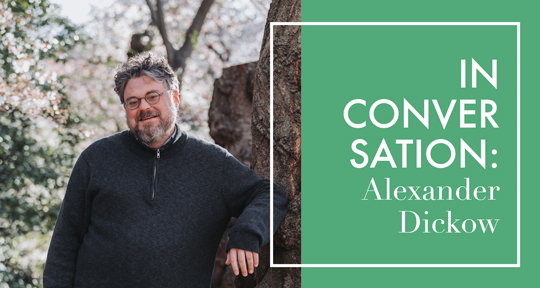Longtime readers may remember our Close Approximations international translation contest, which saw Asymptote give away more than USD20,000 to twenty-five best emerging translators (over four iterations in 2014, 2016, 2017, and 2019)—some of whose translations we promoted to a wider readership through our partnership with The Guardian. One of my thrills as editor-in-chief is to see texts that we have championed—with money we raised by ourselves, or out of our own pocket, since we are not supported by any institution—find permanent homes with publishing houses. Among these is Alexander Dickow’s translation of Sylvie Kandé’s The Neverending Quest for the Other Shore, which judge Eliot Weinberger picked as runner-up in the inaugural contest back in 2014, and which was finally released as a book with Wesleyan University Press three months ago, eight years after its debut on our website. Naturally, I was curious about the journey Dickow, also a former Communications Manager between 2017 to 2020, undertook to publication. Here is the conversation that ensued after I reached out to him.
—Lee Yew Leong, Editor-in-Chief
How did you first encounter Sylvie Kandé’s poetry and what drew you to translate her The Neverending Quest for the Other Shore?
In fact, poet Susan Maurer posted an excerpt on a listserv—WOMPO, the Women in Poetry listserv, I believe. I’d rarely encountered a work that seemed to draw at once on so many different registers and languages; it’s an incredibly heteroglossic work. I was impressed enough with the excerpt that I sought The Neverending Quest out shortly after, and then reached out to Sylvie to compliment her on such a remarkable epic. We entered into conversation, and I ended up translating the portion for Asymptote’s contest without the intention of translating the whole book—but then got drawn into the project further, and decided to tackle the entire thing.
Much like, say, Philip Roth’s The Plot Against America, Neverending Quest offers readers an alternate history—in this case, what would have happened had explorers dispatched in pirogues by Malian Emperor Abubakar discovered America before Christopher Columbus; in the final canto, though, there is a fascinating pivot: from the ordeal of the fourteenth-century voyager to that of the twenty-first-century migrant crossing treacherous waters. What do you think the poet is trying to achieve with this?
As for the comparison with modern-day migrants, it postulates that Abubakar’s outsized heroism (dangerously close to pure folly) is similar to the heroism of these men and women searching for their destiny. A common misperception is that African migration happens because of economic or political desperation. But in fact, that migration, which mostly happens within the African continent, is more a kind of initiation, an Adventure! rather than an act of desperation, and that’s true even when economic or political hardship may be present also. Alassane, the migrant of whose name we are unsure and whose name echoes that of Ulysses, is very much this kind of hero: we see him leaping into the ocean to swim for shore, evading the coast guard and deportation. Does he make it to shore? I don’t know! But he is likely to look more and more like a hero in days which will see huge numbers of climate refugees striving for a home. Alassane is reaching for a new home. Abubakar also, or the people of Mali who accompany him, in their own way. Aren’t we all?
I want to give credit where credit is due: the above response comes as much from hearing Sylvie speak, and from conversations with her, as it does from my own imagination.
The edition that Wesleyan University Press released three months ago sets the French original with your English translation side by side, and it was great to be able to compare the two. It’s thrilling to see how much you were able to get across in the English translation—plus, it also sings! What were some of the challenges you faced in the translation process? I’m eager to find out about the nuances that were perhaps sacrificed, in your opinion.
Nuances I sacrificed: at the end of certain “laisses” (groups of verses of unequal length that constitute the epic’s segments, modeled on the laisses of the Song of Roland for instance), Sylvie turns to metrical verse. I decided that would be a bit jarring in some cases for Anglophone readers. In other works, such as my translation of Max Jacob’s Central Laboratory (Wakefield Press, forthcoming around July 2022), I translate in metrical verse, as well as I can. But it didn’t seem worth the risks in this case. I waffle about whether that was the right decision, and still can’t really decide. Another thing that doesn’t translate as well are the Africanisms of the French, borrowed from linguistic habits of West Africans who speak French, particularly in Senegal. I did my best, but there are obviously no direct equivalents. The same ultimately goes for some ordinary French colloquialisms—slang and the like is always challenging in translation! READ MORE…



